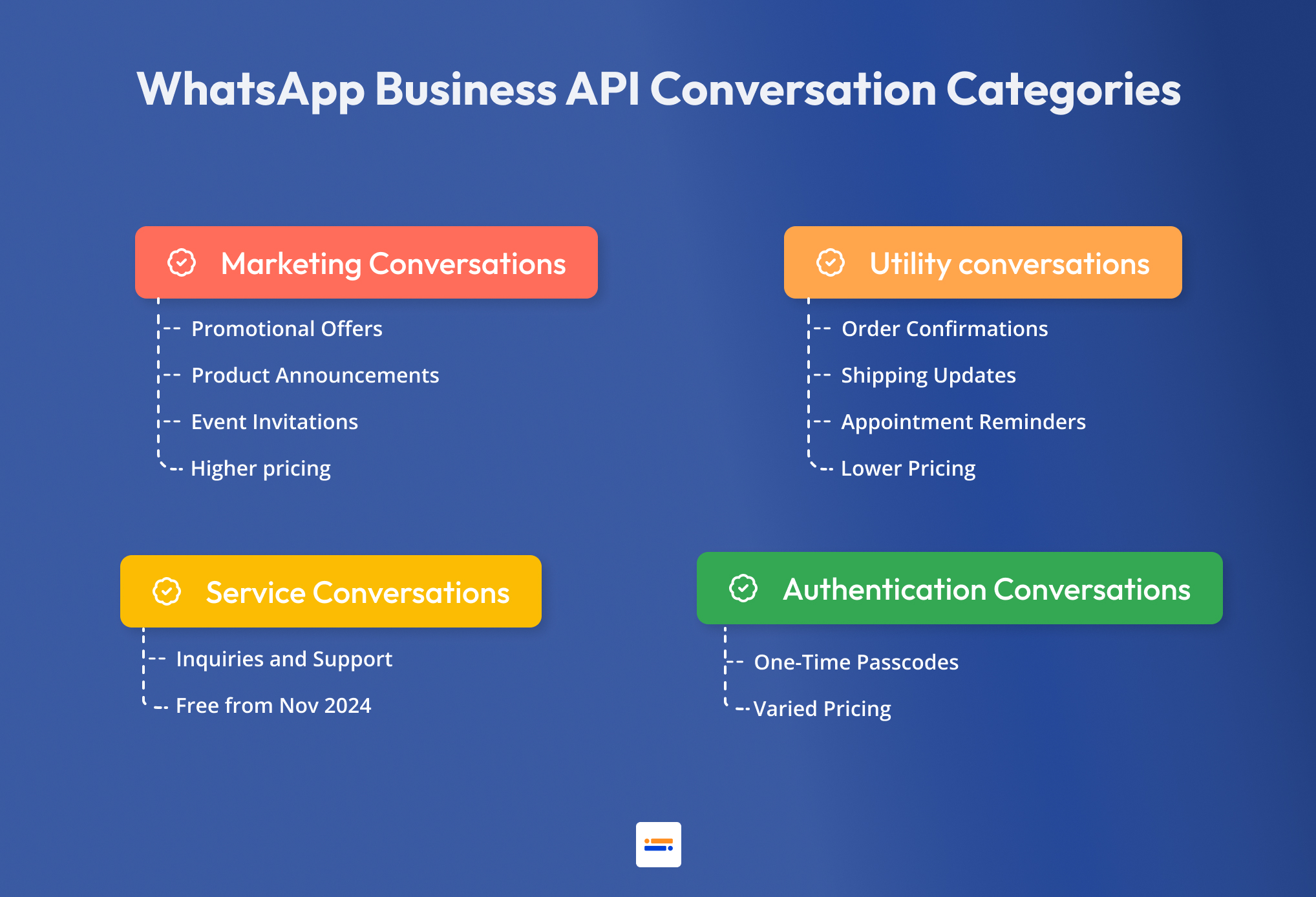Navigating WhatsApp Business API pricing can feel complex. With over 2 billion users, WhatsApp has become essential for businesses.
Yet, understanding its pricing structure may seem like decoding a cryptic message. This article breaks down WhatsApp's conversation-based pricing, regional variations, and upcoming changes that will impact business budgets for 2025 and beyond.
Overview of WhatsApp Business API Pricing
The WhatsApp Business API lets companies communicate with customers at scale. Unlike the free WhatsApp Business App, the API offers advanced features for larger operations. However, this enhanced functionality comes with a price tag.
Conversation-Based Pricing Model
WhatsApp Business API uses a conversation-based pricing model. Businesses are charged for each 24-hour conversation window, not per message sent. Costs fluctuate based on the message type and the recipient's location.
Categories of Conversations
There are four main categories of conversations:
- Service
- Marketing
- Utility
- Authentication
Each category serves a different purpose and comes with its own pricing. For example, a marketing message promoting a new product costs differently than a service conversation initiated by a customer.
Want to see how businesses are leveraging these different conversation types? Explore our comprehensive guide on WhatsApp API use cases to discover real-world applications across various industries.
Regional Variations
Regional variations add complexity to pricing. A conversation with a customer in India might cost less than a similar interaction in the United States. This disparity reflects differences in market conditions and economic factors across regions.
Conversation Categories

WhatsApp Business API categorizes conversations into four types, each with its own purpose and pricing implications. Understanding these categories helps businesses optimize communication and manage costs.
Message templates determine conversation categories: marketing templates start marketing conversations, utility templates initiate utility conversations, and authentication templates start authentication conversations.
Service Conversations
Service conversations are user-initiated interactions for inquiries, concerns, or support requests. Starting November 1, 2024, service conversations will be free, replacing the previous model of 1,000 free conversations per month.
This change aims to encourage customer-business interactions without financial barriers.
Marketing Conversations
Marketing conversations are business-initiated messages to promote products or services. They include promotional offers, product announcements, and event invitations. Pricing for marketing conversations is higher due to their potential for driving business growth.
For example, in Saudi Arabia, a marketing message costs about $0.17, more than other conversation types in the same region.
Utility Conversations
Utility conversations deliver transactional information like order confirmations, shipping updates, and appointment reminders. These business-initiated messages are often priced lower than marketing messages.
In India, a utility conversation might cost around ₹0.160, while a marketing conversation could cost ₹0.882 in the same region.
Authentication Conversations
Authentication conversations involve security and verification. They include one-time passcodes (OTPs) for user authentication or transaction verification.
Pricing for authentication messages varies, especially for international authentication. Starting February 1, 2025, WhatsApp plans to reduce international authentication rates in new and existing markets.
Categorization Process
Message templates determine conversation categories:
- Marketing templates start marketing conversations.
- Utility templates initiate utility conversations.
- Authentication templates start authentication conversations.
User-initiated interactions are classified as service conversations. If a template combines utility and marketing content, WhatsApp categorizes it as a marketing conversation to avoid ambiguity.
Understanding these categories and their determination is crucial. To maximize the value of the WhatsApp Business API, companies should align message types with their business objectives. This approach also helps manage expenses effectively.
WhatsApp Pricing Calculator
Navigating WhatsApp Business API pricing can be challenging, especially with country variations and different conversation types. To simplify this, we've developed an interactive tool that provides quick and accurate pricing information based on your specific needs.
How the Pricing Calculator Works
This pricing calculator lets you select your country and the type of conversation. It then displays the current pricing for that combination, giving you a clear understanding of costs in your region.
Comparing Costs Within a Country
Using this calculator, you can compare costs of conversation types within your country. For example, in Brazil, a marketing conversation costs $0.0625, while a utility conversation costs $0.0080. This difference highlights the importance of categorizing messages correctly to optimize spending.
Understanding Regional Pricing Variations
The tool also helps with regional pricing variations. For instance, you might see that authentication messages in India cost $0.0014, while in Indonesia, they're $0.0300. This insight is valuable for businesses operating in multiple countries, aiding in accurate budgeting for WhatsApp communication strategies.
Staying Updated with Pricing Changes
While this tool provides current pricing information, remember that the WhatsApp Business API pricing structure can change. Significant changes are planned for 2024 and 2025, so check back regularly for the most up-to-date information.
Are you building a WhatsApp chatbot? We've put together a comprehensive guide to walk you through the process of creating your very own WhatsApp chatbot.
Pricing Structure
WhatsApp's pricing for its Business API is flexible to meet various business needs and market conditions. Understanding this structure helps businesses budget and optimize their WhatsApp communication strategies.
Conversation-Based Pricing Explained
WhatsApp's model charges based on conversation windows, not per message. Businesses get billed for each 24-hour conversation window, encouraging natural conversations without per-message costs.
A conversation starts when a business sends a message to a user. It includes all messages exchanged within the next 24 hours. If the conversation continues beyond that timeframe, a new 24-hour period starts, and the business gets charged again. This can be cost-effective for businesses with lengthy interactions.
Regional Variations in Pricing
WhatsApp's pricing varies significantly by region. Costs reflect market conditions, user behavior, and economic factors.
For example, a service conversation in India might cost $0.0040, while in France, it could be $0.0859. Marketing conversations emphasize this disparity even more, with India at $0.0107 and France at $0.1432.
These differences mean businesses operating in multiple countries need to customize their WhatsApp strategy per market. A cost-effective campaign in one country could be expensive in another.
Sample Pricing
Here’s a look at sample pricing for different conversation types across various countries:
| Country | Marketing | Utility | Authentication | Service |
|---|---|---|---|---|
| Brazil | $0.0625 | $0.0080 | $0.0315 | $0.0300 |
| Egypt | $0.1073 | $0.0052 | $0.0618 | $0.0644 |
| Germany | $0.1365 | $0.0550 | $0.0768 | $0.0819 |
| India | $0.0107 | $0.0014 | $0.0014 | $0.0040 |
| UK | $0.0529 | $0.0220 | $0.0358 | $0.0388 |
Insights from Sample Pricing
From the samples, marketing conversations are the most expensive across all countries. However, costs for other conversation types vary. In Egypt, service conversations are pricier than authentication, while in Germany, authentication conversations are cheaper than service ones.
Absolute price differences between countries are also stark. A marketing conversation in India is cheaper than a service conversation in many other places. This underscores the need to tailor strategies to specific markets.
Importance of Understanding Pricing Nuances
Understanding these pricing nuances is crucial for businesses. By carefully considering the types of conversations and the regions they operate in, companies can optimize their use of the WhatsApp Business API for cost-effective and impactful customer communication.
_To gain deeper insights into optimizing your chatbot strategy, be sure to check out our article on the best WhatsApp chatbots available.
Upcoming Changes to Pricing
WhatsApp is set to introduce significant changes to its Business API pricing over the next couple of years. These changes aim to simplify the pricing model and provide more value to businesses. Let's explore these modifications in detail.
By July 1, 2025, WhatsApp will fully implement a new charging model where all businesses will be charged per template message instead of per conversation window.
November 1, 2024: Free Service Conversations
Starting November 1, 2024, all service conversations will be free. This is a major shift from the current model, which allows 1,000 free service conversations per month. By removing charges for service conversations, WhatsApp encourages businesses to offer more responsive and comprehensive customer support without cost worries.
This change might lead companies to:
- Expand support hours
- Increase response depth
- Proactively reach out with service-related information
These actions could improve customer satisfaction and loyalty.
February 1, 2025: Changes to Authentication Rates
From February 1, 2025, WhatsApp will adjust international authentication rates. This involves:
- Expanding authentication rates to new markets
- Reducing rates in existing markets
While specific markets haven't been detailed, this move aims to make authentication more accessible and cost-effective globally. For international businesses, this offers more predictable costs for security-related communications.
April 1, 2025: Free Utility Templates and New Charging Model
Effective April 1, 2025:
- Utility templates will be free within a 24-hour window
- Phase 1 businesses will be charged per template message instead of conversation-based pricing
Free utility templates within a 24-hour window benefit businesses sending transactional messages like order confirmations or shipping updates. This allows timely, relevant information without extra costs.
The shift to per-template message charging for Phase 1 businesses means more granular cost control. Businesses will be charged based on the exact number of messages sent rather than per conversation window.
July 1, 2025: Full Rollout of New Charging Model
By July 1, 2025, WhatsApp will fully implement its new charging model. All businesses will be charged per template message, ending the conversation-based pricing for business-initiated communications.
This shift to per-template message pricing might lead businesses to:
- Use more concise messaging to reduce costs
- Engage in more frequent, focused communications as the 24-hour window constraint is lifted
Preparing for the New Pricing Structure
These changes are a significant evolution in WhatsApp's approach to business communications. The new pricing aims to create a more flexible and cost-effective environment for businesses.
Companies using or planning to use WhatsApp Business API should start preparing now to take full advantage of the new structure when it comes into effect.

No trial. Generous free plan.